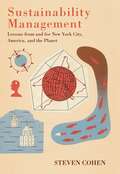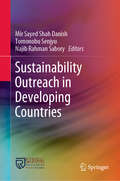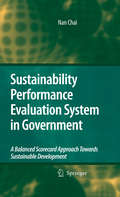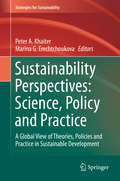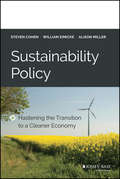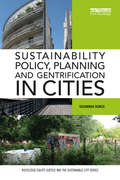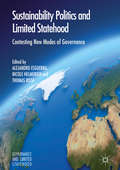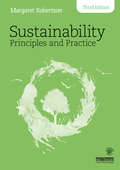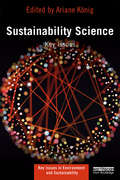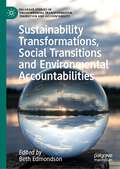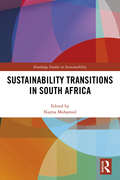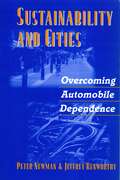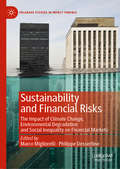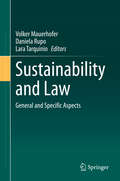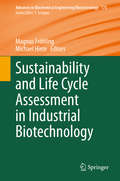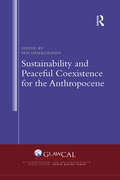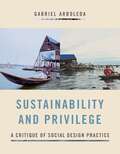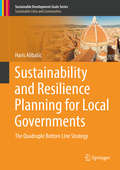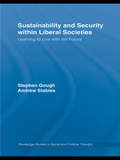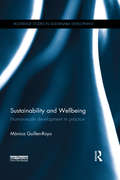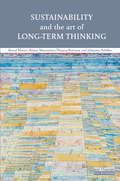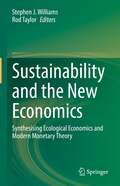- Table View
- List View
Sustainability Management: Lessons from and for New York City, America, and the Planet
by Steven CohenCan we grow our world economy and create opportunities for the poor while keeping the planet intact? Can we maintain our vibrant, dynamic lifestyles while ensuring the Earth stays productive and viable? Aimed at managers, students, scholars, and policymakers, Sustainability Management answers these questions in the affirmative, arguing it is possible for environmentally sustainable business practices and policies to foster economic and long-term growth. Written by a former analyst and consultant with the EPA, this book originally combines sustainable efforts in water, agriculture, urban, and power management to achieve-in practice, not just in theory-a sustainable planet and economy. Steven Cohen begins with the technical, financial, managerial, and political challenges of such a project, and then honestly assesses sustainable practices in the manufacturing and service industries. He addresses renewable and carbon-free energy production; water sustainability, especially with regard to energy issues involving filtration, distribution, and changing rainfall patterns; food cultivation and distribution; and ways to maintain the interdependent systems on which we depend to live. Taking examples from New York City, one of the most sustainable and sustainability-minded metropolises in the world, Cohen explains how everything from construction to waste management can be designed to facilitate a sustainable environment, not just for New York but also for the world. He concludes with this macroscopic view, outlining the global efforts necessary to preserve biodiversity and ecosystems, and the impact of war, terrorism, and human conflict on sustainability.
Sustainability Outreach in Developing Countries
by Tomonobu Senjyu Mir Sayed Shah Danish Najib Rahman SaboryThis book presents a comprehensive collection of recent research on the timely topic of sustainable development goals, with a focus on developing countries. In this manner, it furnishes interdisciplinary coverage in terms of sustainable development; it sets forth the pillars of sustainability (environmental, technical and technological, social, institutional, and economic disciplines); and it explores the adaption of these pillars for long-term sustainability.With its survey of transboundary research, experiences, and lessons learned, the book offers integrated conceptual and empirical contributions from diverse interrelated fields. Viable options are set forth for societies in transition in the twenty-first century to achieve well-being in the lives of their people through the eradication of poverty, mitigation of climate change, promotion of lifelong learning opportunities, and empowerment of society. These options also make it possible to deploy affordable energy, sustain economic growth, offer innovation, reduce inequality, and finally, to help ensure global sustainability.
Sustainability Performance Evaluation System in Government: A Balanced Scorecard Approach Towards Sustainable Development
by Nan ChaiProgressing towards sustainable development raises important challenges to conducting performance evaluations in governments because there are neither generally accepted methods nor specific standards to be met at present. Sustainability Performance Evaluation System in Government, makes a conceptual contribution to public sustainability performance evaluation and develops a set of framework indicators with the help of the strategic and comprehensive approach "Sustainability Balanced Scorecard". As a conceptual basis for the further research and application, this volume will be of great interest to researchers and practitioners at many levels of environmental / sustainability, public management and strategic control studies. Evaluators will find methodological approaches and applied tools for their work. Decision-makers and managers will find it valuable to manage the social, economic and environmental issues in a balanced and integrated manner. Governments will also find it helpful in assisting them in establishing an evaluation system towards sustainable development.
Sustainability Perspectives: A Global View of Theories, Policies and Practice in Sustainable Development (Strategies for Sustainability)
by Peter A. Khaiter Marina G. ErechtchoukovaThe book presents methodological and applied aspects of sustainability and sustainable management from different countries and regions around the globe. It discusses approaches to sustainability assessment, demonstrates how ideas of sustainability and sustainable management are incorporated into public policies and private actions at local and national levels. Authors focus on promoting greater sustainability in natural resource management, energy production and storage, housing design, industrial reorganization, coastal planning, land use, and business strategy, including sustainability indicators, environmental damages, and theoretical frameworks. Chapters reflect environmental, economic and social issues in sustainable development, challenges encountered, and lessons learned as well as solutions proposed.
Sustainability Policy
by Steven Cohen William Eimicke Alison MillerA complete guide to sustainability policy at the federal, state, and local levelsSustainability Policy: Hastening the Transition to a Cleaner Economy is a fundamental guide for public sector professionals new to sustainability policy development, implementation, strategy, and practice. Featuring detailed cases highlighting innovative sustainability initiatives, this book explores the elements that constitute effective policy, and the factors that can help or hinder implementation and adoption. Readers gain insight into policies in effect at the federal, state, and local levels, in the areas of water, energy, material use, and waste management, and the reasons why local policies are often the most innovative and successful. Discussion surrounding monitoring and measurement addresses the lack of standardization, as well as the government's critical role in leading the field toward generally accepted sustainability metrics, while outlining the reasons why certain policies are more feasible than others.This book is an introductory resource, written in non-technical language, and organized in a coherent manner that establishes foundational knowledge before introducing more complex issues. Even readers with little background in sustainability will gain insight into the current state of the field and the issues at hand.Understand sustainability in public and private enterprises, including the role of government and public policyLearn the current standing federal, state, and local policies surrounding sustainabilityDiscover what makes an effective sustainability policy, including measurement and evaluation metricsExplore the politics and future of sustainability, and the barriers to changeSustainability is a hot topic in both the public and private sector, with vocal advocates on both sides of every issue, so developing effective policy is crucial. For public sector professionals entering the sustainability field, Introduction to Sustainability Policy & Management is a valuable resource.
Sustainability Policy, Planning and Gentrification in Cities (Routledge Equity, Justice and the Sustainable City series)
by Susannah BunceSustainability Policy, Planning and Gentrification in Cities explores the growing convergences between urban sustainability policy, planning practices and gentrification in cities. Via a study of governmental policy and planning initiatives and informal, community-based forms of sustainability planning, the book examines the assemblages of actors and interests that are involved in the production of sustainability policy and planning and their connection with neighbourhood-level and wider processes of environmental gentrification. Drawing from international urban examples, policy and planning strategies that guide both the implementation of urban intensification and the planning of new sustainable communities are considered. Such strategies include the production of urban green spaces and other environmental amenities through public and private sector and civil society involvement. The resulting production of exclusionary spaces and displacement in cities is problematic and underlines the paradoxical associations between sustainability and gentrified urban development. Contemporary examples of sustainability policy and planning initiatives are identified as ways by which environmental practices increasingly factor into both official and informal rationales and enactments of social exclusion, eviction and displacement. The book further considers the capacity for progressive sustainability policy and planning practices, via community-based efforts, to dismantle exclusion and displacement and encourage social and environmental equity and justice in urban sustainability approaches. This is a timely book for researchers and students in urban studies, environmental studies and geography with a particular interest in the growing presence of environmental gentrification in cities.
Sustainability Politics and Limited Statehood
by Thomas Risse Alejandro Esguerra Nicole HelmerichThe contributors to this book critically examine the performance of new modes of governance in areas of limited statehood, drawing on a range of in-depth case studies on issues of climate change, biodiversity, and health. The Paris Agreement for Climate Change or the Sustainable Development Goals (SDGs) rely on new modes of governance for implementation. New modes of governance such as market-based instruments, public-private partnerships or stakeholder participation initiatives have been praised for playing a pivotal role in effective and legitimate sustainability governance. Yet, do they also deliver in areas of limited statehood? States such as Malaysia or the Dominican Republic partly lack the ability to implement and enforce rules; their domestic sovereignty is limited. Exploring this perspective on governance, the authors demonstrate that areas of limited statehood are not ungoverned or ungovernable spaces. The book elaborates how and under what conditions new modes of governance emerge in areas of limited statehood, and examines their relative effectiveness.
Sustainability Principles and Practice
by Margaret RobertsonSustainability Principles and Practice gives an accessible and comprehensive overview of the interdisciplinary field of sustainability. The focus is on furnishing solutions and equipping students with both conceptual understanding and technical skills. Each chapter explores one aspect of the field, first introducing concepts and presenting issues, then supplying tools for working toward solutions. Elements of sustainability are examined piece by piece, and coverage ranges over ecosystems, social equity, environmental justice, food, energy, product life cycles, cities, and more. Techniques for management and measurement as well as case studies from around the world are provided. The 3rd edition includes greater coverage of resilience and systems thinking, an update on the Anthropocene as a formal geological epoch, the latest research from the IPCC, and a greater focus on diversity and social equity, together with new details such as sustainable consumption, textiles recycling, microplastics, and net-zero concepts. The coverage in this edition has been expanded to include issues, solutions, and new case studies from around the world, including Europe, Asia, and the Global South. Chapters include further reading and discussion questions. The book is supported by a companion website with online links, annotated bibliography, glossary, white papers, and additional case studies, together with projects, research problems, and group activities, all of which focus on real-world problem-solving of sustainability issues. This textbook is designed to be used by undergraduate college and university students in sustainability degree programs and other programs in which sustainability is taught.
Sustainability Science: Key Issues (Key Issues in Environment and Sustainability)
by Jerome Ravetz Ariane König<p>Sustainability Science: Key Issues is a comprehensive textbook for undergraduates, postgraduates, and participants in executive trainings from any disciplinary background studying the theory and practice of sustainability science. Each chapter takes a critical and reflective stance on a key issue or method of sustainability science. Contributing authors offer perspectives from diverse disciplines, including physics, philosophy of science, agronomy, geography, and the learning sciences. <p>This book equips readers with a better understanding of how one might actively design, engage in, and guide collaborative processes for transforming human-environment-technology interactions, whilst embracing complexity, contingency, uncertainties, and contradictions emerging from diverse values and world views. Each reader of this book will thus have guidance on how to create and/or engage in similar initiatives or courses in their own context. <p>Sustainability Science: Key Issues is the ideal book for students and researchers engaged in problem and project based learning in sustainability science.</p>
Sustainability Transformations, Social Transitions and Environmental Accountabilities (Palgrave Studies in Environmental Transformation, Transition and Accountability)
by Beth EdmondsonThis book draws upon diverse approaches and understandings of sustainability transformations, social transitions and environmental accountabilities. It presents case studies that highlight real-world consequences of changing ideas about how best to achieve effective and durable sustainability transformations and examines how environmental accountabilities and social transitions influence sustainability transformations. Each chapter provides insights regarding how new knowledge and perspectives matter for whether, when, and how people, governments, corporations and international organisations seek and pursue solutions to social-ecological challenges and sustainability dilemmas. It pays sustained attention to whether and how understandings and applications of accountability can improve international sustainability transformations. The chapters presented in this book consider some pressing questions concerning social transitions and environmental accountabilities: how can they contribute to sustainability transformations, how do they influence the scalability of sustainability transformations, and, how can such sustainability transformations become durable?
Sustainability Transitions in South Africa (Routledge Studies in Sustainability)
by Najma MohamedSouth Africa’s transition to a greener economy features prominently in the long-term development vision of the country, and is an integral part of the country’s national climate change response strategy. Despite significant gains in socio-economic development since its transition to democracy, the country continues to face the triple challenges of rising unemployment, income inequality and poverty – amid a slowdown in economic growth. Sustainability transitions offer new ways of shifting the trajectory of South Africa’s resource-intensive economy towards low-carbon pathways linked to the country’s transformative development agenda. Calls for inclusive approaches to greening the South African economy, which addresses the most vulnerable in society and ensures that the benefits of sustainability innovations reach all South Africans, are becoming more pronounced as sustainable development policy reforms are being implemented. The question that should be placed centre stage in South Africa’s sustainability discourse is whether notions of justice and inclusivity are being sufficiently addressed in the design and implementation of policy and programme interventions. This book explores South Africa’s sustainability transition through reflections on critical policy, economic, technological, social and environmental drivers. It provides a synthesis of theoretical insights, including new models and concepts, and praxis through illustrations from South Africa’s growing landscape of sustainable development policies and programmes. Finally, it assesses whether these transition pathways are beginning to reconfigure the system-level structures hindering the country’s goal of ‘ensuring environmental sustainability and an equitable transition to a low-carbon economy’.
Sustainability and Cities: Overcoming Automobile Dependence
by Jeffrey Kenworthy Peter NewmanSustainability and Cities examines the urban aspect of sustainability issues, arguing that cities are a necessary focus for that global agenda. The authors make the case that the essential character of a city's land use results from how it manages its transportation, and that only by reducing our automobile dependence will we be able to successfully accommodate all elements of the sustainability agenda. The book begins with chapters that set forth the notion of sustainability and how it applies to cities and automobile dependence. The authors consider the changing urban economy in the information age, and describe the extent of automobile dependence worldwide. They provide an updated survey of global cities that examines a range of sustainability factors and indicators, and, using a series of case studies, demonstrate how cities around the world are overcoming the problem of automobile dependence. They also examine the connections among transportation and other issues--including water use and cycling, waste management, and greening the urban landscape--and explain how all elements of sustainability can be managed simultaneously. The authors end with a consideration of how professional planners can promote the sustainability agenda, and the ethical base needed to ensure that this critical set of issues is taken seriously in the world's cities. Sustainability and Cities will serve as a source of both learning and inspiration for those seeking to create more sustainable cities, and is an important book for practitioners, researchers, and students in the fields of planning, geography, and public policy.
Sustainability and Energy Politics: Ecological Modernisation and Corporate Social Responsibility (Energy, Climate and the Environment)
by Giorel CurranThe author explores the fraught politics of energy transitions in an age of climate change. She does so through an ecological modernisation and corporate social responsibility lens which she contends shapes and underpins sustainability today. Case studies cover climate policy, unconventional gas and renewable energy.
Sustainability and Energy Politics: The Promises of Ecological Modernisation and Corporate Social Responsibility (Energy, Climate and the Environment)
by Giorel CurranSustainability and Energy Politics.
Sustainability and Financial Risks: The Impact of Climate Change, Environmental Degradation and Social Inequality on Financial Markets (Palgrave Studies in Impact Finance)
by Marco Migliorelli Philippe DessertineDespite growing discussions on the relationship between sustainability and finance, so far little attention has been given to the relation linking sustainability-related risks and financial risks. Climate change, environmental degradation and social inequality, among others factors, may indeed have considerable adverse impacts on financial actors and markets, and even have the potential to harm financial stability. Shedding light on the importance of the nexus between sustainability and financial risks, this book addresses the need for new industry and policy approaches. With insights from a skilled set of scholars in the finance field, this edited collection explores the effects of climate risks on the banking and insurance industries, the problem of stranded assets, the possible corporate risk management frameworks that could be used to control sustainability-related risks, the role of non-financial disclosure in fostering market discipline, and the policy actions needed to integrate sustainability considerations into prudential supervision. Tackling an interdisciplinary topic, this book will appeal to academics and practitioners within the finance, business and sustainability fields.
Sustainability and Law: General and Specific Aspects
by Volker Mauerhofer Daniela Rupo Lara TarquinioThe book discusses sustainability and law in a multifaceted way. Together, sustainability and law are an emerging challenge for research and science. This volume contributes through an interdisciplinary concept to its further exploration. The contributions explore this exciting domain with innovative ideas and replicable approaches. It combines a variety of authors, from both the public and the private sectors, and thereby guarantees a broad view that enshrines the more theoretical arguments from the academic side as well as stronger practical applicable perspectives. The book provides space for thoughtful expansions of established theories as well as the hopeful emergence of innovative ideas. Moreover, the combination of three to five contributions into the eleven parts respectively aims toward a compression of like minded thoughts. This should lead to an intensification of exchange of viewpoints from different angles on a similar theme. Readers therefore also have the opportunity to concentrate on single chapters, but receive comprised knowledge and a variety of thoughts for new ideas on a particular theme.
Sustainability and Life Cycle Assessment in Industrial Biotechnology (Advances in Biochemical Engineering/Biotechnology #173)
by Magnus Fröhling Michael HieteThis book reviews the assessment of industrial biotechnology products and processes from a sustainable perspective. Industrial Biotechnology is a comparably young field which comes along with high expectations with regard to sustainability issues. These stem from the promise of reducing greenhouse gas emissions and replacing fossil resources in the near or later future and using green technology, i.e. more environmentally friendly technologies. The intended economic, ecological and social benefits, however, need to be proven, resulting in a variety of challenges, both from a methodological and application point of view. In this book, specific assessment and application topics of industrial biotechnology are addressed, highlighting challenges and solutions for both developers and users of assessment methods. In twelve chapters, experts in their particular fields define the scope, characterize industrial biotechnology and show in their contributions the state of the art, challenges and prospects of assessing industrial biotechnology products and processes.The chapter 'Societal and Ethical Aspects of Industrial Biotechnology' of this book is available open access under a CC BY 4.0 license at link.springer.com
Sustainability and Peaceful Coexistence for the Anthropocene (Transnational Law and Governance)
by Pasi HeikkurinenThe rapid industrialization of societies has resulted in radical changes to the Earth’s biosphere and its local ecosystems. Climate scientists have recorded and forecasted worrying global temperature rises going back to the early twentieth century, while biologists and palaeontologists have suggested that the next mass extinction is on its way if the current rate of species loss continues. To avert further ecological damage, excessive natural resource use and environmental deterioration are challenges that humanity must deal with now. The human species has had such a significant impact on the natural environment that the present geological epoch can be referred to as the ‘Anthropocene’, the age of humans. The blame and responsibility for the prevailing unsustainability, however, cannot be assigned equally to all humans. To analyse the root problems and consequences of unsustainable development, as well as to outline rigorous solutions for the contemporary age, this transdisciplinary book brings together natural and social sciences under the rubric of the Anthropocene. The book identifies the central preconditions for social organization and governance to enable the peaceful coexistence of humans and the non-human world. The contributors investigate the burning questions of sustainability from a number of different perspectives including geosciences, economics, law, organizational studies, political theory and philosophy. The book is a state-of-the-art review of the Anthropocene debate and provides crucial signposts for how human activities can, and should, be changed.
Sustainability and Privilege: A Critique of Social Design Practice
by Gabriel ArboledaSocial design—the practice of designing for poverty relief—is one of the most popular fields in contemporary architecture. Its advocates, focusing on the architect’s creativity and good intentions, are overwhelmingly laudatory, while its detractors, concerned with the experience of its beneficiaries, have dismissed it as an expression of cultural imperialism. Placed midway between innocuous celebration and radical critique, Sustainability and Privilege highlights the lessons that can be learned from social design’s current limitations and proposes a feasible way to improve this practice.In this broad-ranging account, enlivened by fieldwork and case studies, Gabriel Arboleda contends that social design’s invocation of sustainability often serves to marginalize and displace vulnerable populations through projects that involve experimentation of faulty alternative technologies, or that result in so-called green gentrification, or that impose untoward economic and other burdens. Arboleda is fiercely critical of the way social design has been carried out in impoverished regions of the world, most notably in Africa and Latin America. In addressing the challenges posed by issues of privilege in social design’s use of sustainability, the book proposes a new interdisciplinary approach called ethnoarchitecture, arguing for a simpler, open-ended, and stakeholder-driven process that eliminates the casual imposition of the architect’s ideas on vulnerable populations, foregrounding the people’s voices, experience, and input in social design practice.
Sustainability and Resilience Planning for Local Governments: The Quadruple Bottom Line Strategy (Sustainable Development Goals Series)
by Haris AlibašićThis book details a process of creating a long-term sustainability and resilience plan for local governments to use in designing and implementing sustainability and resilience-related policies, initiatives, and programs. It offers guidance and methods in applying sustainability and resilience strategies to attain the prosperity of organizations and communities. The recommendations in this book are based on the author's years of experience in directing applied resilience and sustainability planning for a local government, and years of research covering diverse aspects of sustainability and resilience from climate change, climate preparedness and readiness, quadruple bottom line strategy, greenhouse gas emission reduction policies, climate adaptation and mitigation to sustainable energy policies and initiatives. Chapter one defines terms related to sustainability and resilience and addresses how the topics reshape local governments and communities. Chapter two maps out the sustainability and resilience process for organizations and communities, determining the appropriate steps to be taken at each level of sustainability and resilience planning. Chapter three identifies community and organizational level engagement, with internal and external stakeholders, including designs necessary throughout these processes. Chapter four contains measuring, tracking, monitoring and reporting methods using the quadruple bottom line strategy, and developing a sustainability and resilience progress report to ensure accountability, transparency, and good governance. Then, chapter five details the implementation of a sustainability and resilience plan once it is established, describing potential programs and initiatives to achieve sustainable and resilient communities. Chapter six describes the intersection between sustainability and resilience, and chapter seven examines the tools and resources available to create a practical sustainability and resilience plan. Chapter eight concludes the text by addressing the future of sustainability and resilience, and complexities of the modern dynamics of the interconnected systems in cities, counties, and organizations, and recommends how local government administrators in their planning methods and strategies must consider these challenges.
Sustainability and Security within Liberal Societies: Learning to Live with the Future (Routledge Studies in Social and Political Thought #Vol. 58)
by Stephen Gough Andrew StablesMuch of the world will be living in broadly "liberal" societies for the foreseeable future. Sustainability and security, however defined, must therefore be considered in the context of such societies, yet there is very little significant literature that does so. Indeed, much ecologically-oriented literature is overtly anti-liberal, as have been some recent responses to security concerns. This book explores the implications for sustainability and security of a range of intellectual perspectives on liberalism, such as those offered by John Rawls, Robert Nozick, Frederick Hayek, Ronald Dworkin, Michael Oakeshott, Amartya Sen and Jürgen Habermas.
Sustainability and Wellbeing: Human-Scale Development in Practice (Routledge Studies in Sustainable Development)
by Mònica Guillen-RoyoThe idea that we can meet human needs and simultaneously conserve and even enhance the natural environment is an attractive one. Since the Brundtland report popularised a definition of sustainable development based on the concept of needs, there has been a widespread belief that it should be possible to achieve a good quality of life without compromising natural ecosystems. Sustainability and Wellbeing fills a gap in sustainable development studies by drawing on a range of case-studies to discuss the challenges and opportunities of using Max-Neef’s Human Scale Development (HSD) framework in practice. The first section presents the theory and the methodology of HSD in the context of related literature on sustainable development and wellbeing. The second section discusses applications of the HSD methodology with three different purposes: the design of sustainable development interventions; the engagement of researchers with communities or groups of people in sustainability processes and the consolidation of sustainable community initiatives. Finally, the third reflects on challenges and limitations of using the HSD approach to define strategies for sustainable development and concludes. This is an invaluable resource for researchers and postgraduate students in wellbeing, sustainability, sustainable development, and human development.
Sustainability and the Art of Long-Term Thinking (Routledge Studies in Sustainability)
by Thomas Petersen Bernd Klauer Reiner Manstetten Johannes SchillerDealing with time is intimately linked to sustainability, because sustainability, at its core, involves long-term ethical claims. To live up to them, decision and policy-making has to consider long-term development of society, economy, and nature. However, dealing with time and such long-term development is a notoriously difficult subject, both in science and, in particular, in practical decision and policy making. Rooted in philosophical and scientific reasoning, this book explores how the concept of time can be incorporated into effective practical action. The book describes a system and uses case studies to help sustainability practitioners and researchers consider the long-term consequences of our actions in a methodical way. The system integrates scientific and practical knowledge about time and temporal developments to help break down the sometimes overwhelming complexity of sustainability issues. Combining theoretical conceptual thinking and practical applications, this book will be of great interest to students and researchers of sustainability science, environmental sciences, sustainable development, environmental economics, political sciences and practical philosophy.
Sustainability and the New Economics: Synthesising Ecological Economics and Modern Monetary Theory
by Rod Taylor Stephen J. WilliamsThis multidisciplinary book provides new insights and hope for sustainable prosperity given recent developments in economics – but only if swift and strong actions consistent with Earth’s biophysical limits and principles of justice are universally taken. It is one thing to put limits on resource throughput and waste generation to conform with the ecosphere’s biocapacity. It is another thing to efficiently allocate a sustainable rate of resource throughput and ensure it is equitably distributed in the form of final goods and services. While the separate but interdependent decisions regarding throughput, distribution, and allocation are the essence of ecological economics, dealing with them in a world that needs to cure its growth addiction requires a realistic understanding of macroeconomics and the fiscal capacity of currency-issuing central governments. Sustainable prosperity demands that we harness this understanding to carefully regulate the rate of resource throughput and manipulate macroeconomic outcomes to facilitate human flourishing. The book begins by outlining humanity’s current predicament of gross ecological overshoot and laments the half-century of missed opportunities since The Limits to Growth (1972). What was once economic growth has become, in many high-income countries, uneconomic growth (additional costs exceeding additional benefits), which is no longer advancing wellbeing. Meanwhile, low-income nations need a dose of efficient and equitable growth to escape poverty while protecting their environments and the global commons. The book argues for a synthesis of our increasing knowledge of the ecosphere’s limited carrying capacity and the power of governments to harness, transform, and distribute resources for the common good. Central to this synthesis must be a correct understanding of the difference between financial constraints and real resource constraints. While the latter apply to everyone, the former do not apply to currency-issuing central governments, which have much more capacity for corrective action than mainstream thinking perceives. The book joins the growing chorus of authoritative voices calling for a complete overhaul of the dominant economic system. We conclude with policy recommendations based on a new economics that, if implemented, would come close to guaranteeing a sustainable and prosperous future. Upon reading this book, at least one thing should be crystal clear: business as usual is not a viable option.
Sustainability and the Philosophy of Science (Routledge Focus on Environment and Sustainability)
by Jeffry L. RamseyThis book demonstrates how the philosophy of science can enhance our understanding of sustainability and the practices we use to enact it. Examining assumptions about concepts, theories, evidence, and the moral ideals of sustainability can better orient us as we pursue this urgent and important goal. The book applies perspectives and tools from the philosophy of science – construed broadly to include portions of science and technology studies, history of science, and philosophy more generally – to sustainability discourse. It argues that widely held assumptions regarding the meaning of concepts, methods of theorizing and inferential practice, evidential structure, and ethics limit our understanding and practice of sustainability. It offers philosophical alternatives that capture more fully the confusing, wicked nature of sustainability challenges. The alternatives draw attention to existing but often undervalued frameworks in sustainability discourse. This book is aimed towards academics, researchers, and post-graduates working in sustainability, as well as philosophers of science and environmental philosophers interested in the philosophical issues raised by the pursuit of sustainability.
